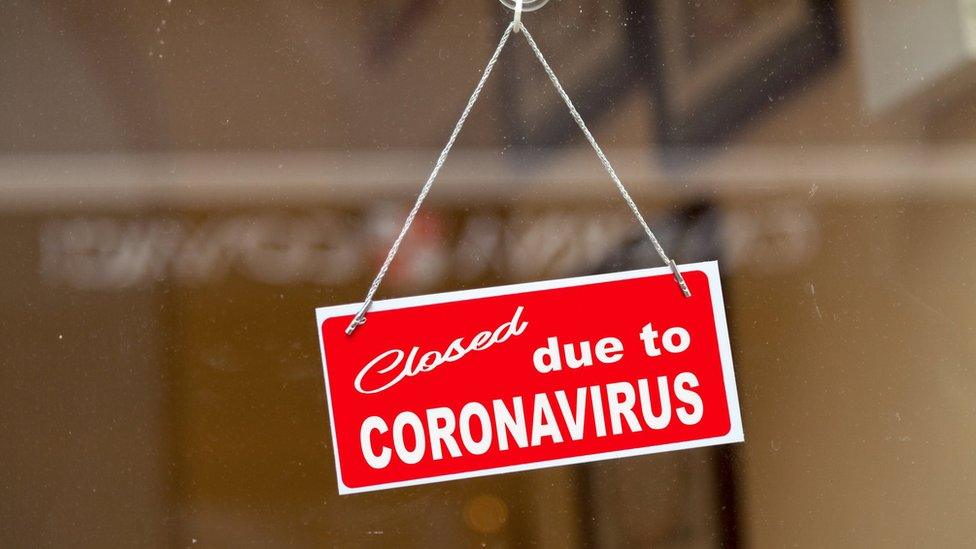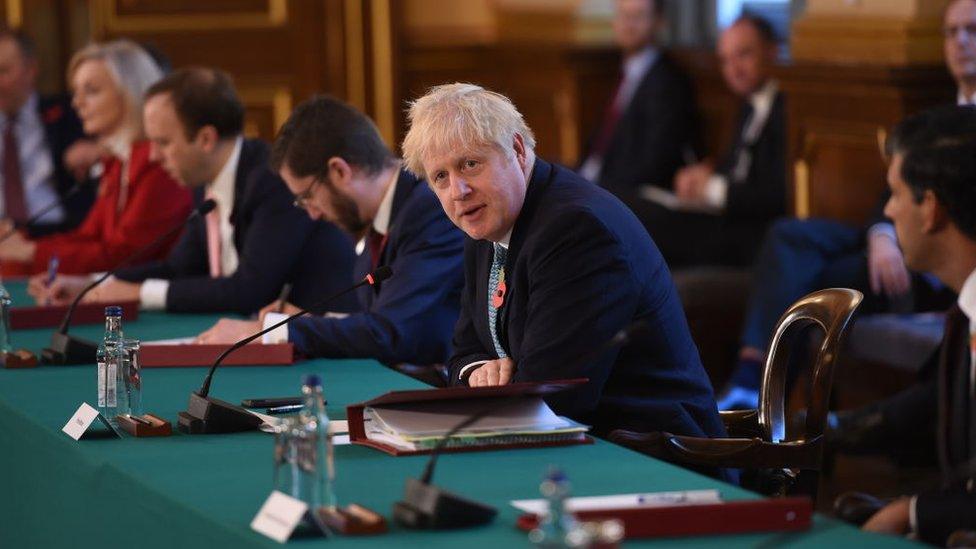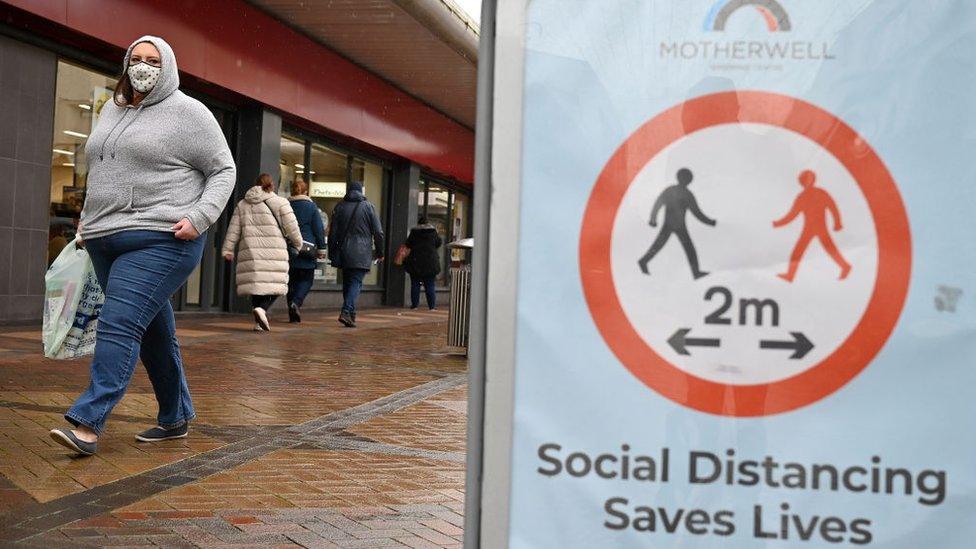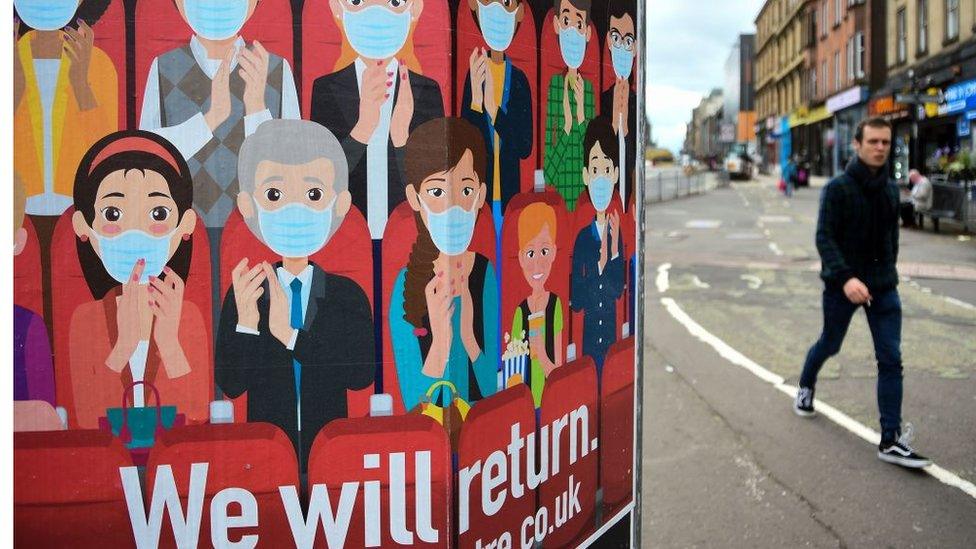Covid in Scotland: What's the furlough scheme row all about?
- Published

There is confusion over whether the UK government's job support "furlough" scheme could be used in Scotland after the latest English lockdown ends in December. What is the row all about, and what could the consequences be?

Can people in Scotland still be furloughed?
Yes, the furlough scheme is currently still in full operation across the UK, having been extended through to December 2 to cover a new lockdown in England.
It sees the Treasury cover 80% of a worker's wages, up to a maximum of £2,500 a month.
What this row is about is whether similar funding would be available in other parts of the UK later on, should they need to go into lockdowns of their own.
The Scottish and Welsh governments argue that it cannot be fair for the full support package to only be available when England is in lockdown.
And First Minister Nicola Sturgeon has said she might even have to introduce harsher restrictions in Scotland this month, if this is the only point at which enhanced economic support will be available.
Covid in Scotland: First minister faces 'dilemma' over lockdown decision
Who has said what?
Calls for clarity have been building on a cross-party basis, with the Scottish Conservatives and the SNP united in demanding answers.
Pressed by MPs on Monday, Prime Minister Boris Johnson repeatedly stressed that "the furlough scheme is a UK-wide scheme".
He then added: "If other parts of the UK decide to go into measures that require the furlough scheme, then of course it is available to them. That has to be right. That applies not just now but of course in the future as well."
The Scottish Conservatives trumpeted this as a decisive guarantee from the prime minister.
However, the very next morning, Housing Secretary Robert Jenrick was sent out on the morning media round - and when asked to provide a "cast iron guarantee" about the flexibility of furlough, he suggested that the decision would be one for the Chancellor.
Treasury Secretary Steve Barclay faced MPs on Tuesday afternoon, and he repeatedly said that "the government will always be there to provide support to all parts of the UK".
Meanwhile, the prime minister's spokesman was also quoted as saying that "direct economic support" would be available - without specifying whether that extended to the furlough system at 80% of wages.
Ms Sturgeon issued yet another appeal for clarity, saying that "woolly words don't pay people's wages".

Boris Johnson made what some in his party have painted as a decisive pledge about furlough
What's the problem?
If there is hesitancy to give guarantees on the part of the Treasury, it will be because they do not want to relinquish control over the purse strings in such uncertain circumstances.
After all they would have no idea or control over how long a lockdown in Scotland or Wales might go on, but would have to fund generous job support schemes throughout these indefinite periods.
We are after all talking about a hypothetical lockdown, and there is a range of unanswered questions about how it would all work.
Would it have to be a Scotland-wide lockdown for full furlough support to kick in, or could it apply in areas that are placed in the top level of restrictions?
Wouldn't English councils and city mayors who find themselves in the top tier of their system then demand similar treatment?
Who actually makes these decisions?
Just from a practical perspective, the bean counters at the Treasury will be wary about writing a blank cheque.

Is there a political dimension?
For some Conservatives - Scottish ones in particular - political concerns will trump the practical ones.
While politicians routinely insist the pandemic should not be a party-political campaigning point, it is all but certain to feature heavily in next May's Scottish Parliament election.
To start with, the pandemic and how it has been managed has undoubtedly affected public attitudes towards politicians and governments, which will inevitably filter through into how people vote.
And the furlough scheme will doubtless have been central to Douglas Ross's plans to argue that the "broad shoulders of the UK" have helped Scotland through the pandemic, protecting a million jobs.
Any suggestion that the scheme is actually only available when needed in England would rather severely take the shine off this as a unionist argument, which is one reason why Mr Ross has been so vocal on the issue.
So this is not just an issue for right now, or indeed for December, when the English lockdown is due to end. It could ultimately echo right through to the Holyrood elections next spring - and on into the campaign for any future Scottish independence referendum.


- Published3 November 2020
